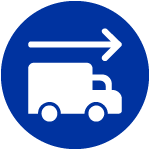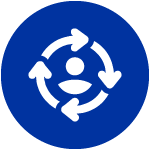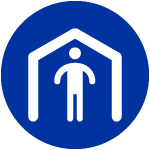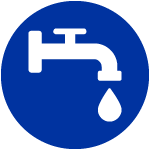-
Who we are
WHO WE AREFollowing the UN Secretary-General's request to IOM and UNHCR to co-lead the regional inter-agency response, the Office of the Director General’s Special Envoy for the Regional Response to the Venezuela Situation (OSE) was established in 2019 to coordinate IOM's assistance for migrants and refugees from Venezuela.
SOBRE NOSOTROS
SOBRE NOSOTROS
OIM Global
OIM Global
-
Our Work
What we doThe Office of IOM´s Special Envoy for Migrants and Refugees from Venezuela is responsible for the coordination and oversight of regional projects within the framework of Venezuela's Migrant and Refugee Response Plan (RMRP) in South America, North America, Central America and the Caribbean, working closely with implementing missions and Regional Offices.
PRIORIDADES TRANSVERSALES
- Where we work
- Data and Resources
- Take Action
- 2030 Agenda
The Regional Response and Coordination Unit is responsible for the coordination and oversight of regional projects within the framework of Venezuela's Refugee and Migrant Response Plan (RMRP) in South America, North America, Central America and the Caribbean, working closely with implementing missions and Regional Offices.
All initiatives and activities implemented by IOM at regional and country level are aligned with the 2023-2024 Response Plan and sector-specific objectives.

Common Services
- Coordination: To improve harmonisation and the efficiency of response and support provided to the Quito Process through R4V Platform coordination meetings at the regional and national level. Strengthen capacity among members and external actors through workshops and trainings is also an objective.
- Information Management: Collect and analyse data on human mobility and emerging trends through the implementation of Displacement Tracking Matrix (DTM) activities. DTM data provides humanitarian and development actors, as well as national and local governments, with information needed to better understand the volume, changing needs, vulnerabilities, characteristics and routes of dynamic migrant and refugee flows for evidence-based planning, operational response and advocacy. IOM will also conduct other surveys to assess socio-economic dynamics, labour market, health care services, education, access to rights and irregular migration routes.
- CwC PSEA AAP: Continue efforts to mitigate sexual exploitation and abuse (SEA), facilitate accountability to affected populations (AAP) and promote Community Based Grievance Mechanisms (CBCM) by enhancing the response capacity of UN organizations, civil society partners and national platform members. The CBCM programme will be implemented through assessments, the establishment of best practices and accountability mechanisms, the development of regional strategies, training of trainers and Communication with Communities (CwC) initiatives to disseminate awareness-raising materials to affected populations.
- Communication: Design and launch information campaigns/communication products that address urgent issues for the Venezuelan migrant population such as xenophobia, racism and discrimination, and raise awareness on prevention and vaccination against COVID-19. In addition, campaigns will inform migrants and refugees about rights, labour laws and the regularization process, and promote self-protection and prevention against gender-based violence and human trafficking. IOM also supports governments in developing communication campaigns.

Education
- To improve the access of migrants and refugees from Venezuela to national education systems through the development of inclusion processes, enrolment support, provision of cultural orientation, creation of mechanisms for the recognition of academic certifications and training of professionals to facilitate access to the formal labour market. In addition, IOM provides school kits, uniforms, electronic devices and other elements necessary to promote an inclusive education system.
- To improve access to national education systems for migrants and refugees from Venezuela through the development of inclusion processes, enrolment support, provision of cultural orientation, creation of mechanisms for the recognition of academic certifications and training for professionals to facilitate access to the formal labour market. In addition, IOM will provide school kits, uniforms, and other necessary items to promote an inclusive education system.

Food Security
- To ensure food security for vulnerable populations, IOM works to ensure timely assistance to migrants and refugees from Venezuela. Interventions include both in-kind food distribution and cash assistance such as food vouchers or prepaid cards.
- Increase access to food for migrants and refugees, including children and adolescents, through the provision of in-kind and cash food interventions, including food kits, hot meals, school meals, food vouchers and prepaid cards.
- Ensure long-term food security through the rehabilitation and new construction of food preparation spaces.
- Meet the basic food needs of vulnerable indigenous populations through the provision of agricultural tools, supplies and subsidies.

Health
- Improve physical, mental, and social well-being, IOM addresses the barriers faced by migrants and refugees in accessing essential health care services. In the Latin America and Caribbean region, IOM works closely with partners, governments, and health professionals to ensure the inclusion of Venezuelans in health and rights initiatives.
- In the wake of the COVID-19 pandemic, health-related activities have been expanded and prioritized to ensure that vulnerable populations receive essential medical assistance.
- Health rights through community-based initiatives, improvement of health care facilities and services, and provision of supplies and equipment. The deployment of mobile clinics enables IOM to reach remote and border areas and provide health care, including psychosocial and mental health care, to the most vulnerable.
- Provide psychosocial care, psychological first aid, virtual consultations, and capacity-building of mental health and psychosocial support professionals on interdisciplinary approaches increase access to such services for migrants and refugees.
- Provide technical assistance to national governments, local actors, and health professionals to improve the health service response, including assistance to victims of trafficking and survivors of gender-based violence.
- Support the ongoing response to COVID-19 to ensure access to services and inclusion of migrants and refugees. IOM contributes to strengthening and expanding emergency services, distribution of medical equipment, supplies, and personal protective equipment (PPE), provision of COVID-19 polymerase chain reaction (PCR) tests, and awareness-raising activities on preventive measures.

Humanitarian Transportation
- Safe and orderly migration remains a priority for IOM. The organization has wide experience in both the provision of humanitarian transportation assistance in emergencies around the world, but also support for movement operations and resettlement. In the Latin America and the Caribbean context, IOM’s work on humanitarian transportation aims to assist migrants and refugees from Venezuela with safe and dignified transport to destinations where they are able to access basic goods and services. IOM co-leads the Humanitarian Transport Sector together with UNHCR and the Norwegian Refugee Council.
- To provide humanitarian transport, in kind or through cash-based initiative (CBI), to migrants and refugees from Venezuela. Transportation services will assist migrants and refugees to move from border areas to the main cities and vice versa, from insecure or vulnerable communities to those which greater access to integration as well as transportation within their communities to access basic services. Cross border transportation will be provided to facilitate access to migratory, academic or labour regularisation in countries without Venezuelan diplomatic services. IOM will support key actors in the development of guidelines and tools on humanitarian transportation in countries of transit and permanence.

Integration
- As a co-lead of the Integration Sector under the R4V-platform, IOM plays a key role in coordinating regional efforts to promote self-reliance and resilience of migrants and refugees from Venezuela and affected host populations. The total budget requirement for the Integration Sector under the RMRP 2021 amounts to USD 264 million. IOM implements initiatives which focus primarily on ensuring access to livelihood initiatives, financial inclusion and social cohesion.
- To promote the socio-economic integration of migrants and refugees from Venezuela ensuring equal and tailored labour opportunities for men, women and youth. IOM will facilitate the acquisition of direct skills and provide vocational training, entrepreneurial assistance, and validation of certifications for migrants and refugees to increase their employability, and accessibility to local, formal labour markets. IOM will also facilitate access to income-generating activities through the provision of in-kind grants and seed capital, relevant trainings (such as business start-up and financial literacy) and job fairs, and the implementation of microfinance programs.
- In addition, IOM will strengthen partnerships with and capacities of local authorities, ministries, private sector, academia, employment agencies and civil society to promote corporate social responsibility and the ethical recruitment of migrants and refugees from Venezuela. Social cohesion among migrants, refugees and host communities, will be promoted through cultural events and exchanges as well as community-based initiatives.
- Technical assistance to local governments will be provided to develop and implement evidence-based policies on socio-economic integration.

Multi-Purpose Cash-Based Interventions (CBI)
- As an alternative to traditional in-kind assistance, CBI has gained increasing significance in the delivery of humanitarian aid. The usage of multipurpose cash emphasizes and values the importance of choice for affected populations, while also stimulating local markets. The flexibility of CBI offers rapid response during emergency situations, in particular in situations where established registries of vulnerable populations already exist.
- In the Latin America and the Caribbean region, IOM provides multipurpose cash to ensure safe and dignified access to migrants and refugees from Venezuela. As a result of mobility restrictions implemented to cease the propagation of the COVID-19 pandemic, CBI have increasingly become the preferred and sometimes only plausible alternative for delivery of immediate humanitarian assistance.
- IOM works together with partners in the provision of CBI modalities such as pre-paid cards, electronic or paper vouchers.
- To improve access to basic goods and services through multipurpose financial assistance. This will be done through partnerships with financial institutions and the use of prepaid cards and vouchers amongst others to improve the living conditions and accessibility to basic needs such as rent, energy bills, household items, public transportation, legal assistance, medical support of migrants and refugees from Venezuela and their integration within host communities.

Protection
- Addressing and reducing vulnerabilities among migrants and refugees are important goals in the Global Compact for Safe, Orderly and Regular Migration and in IOM’s work. Ensuring protection and assistance to vulnerable individuals, households and communities is a crucial aspect of humanitarian response.
- The Regional Protection Sector is one of the largest sectors under the R4V-platform, with a budget of USD 241 million under the RMRP 2021. It includes three sub-sectors where IOM co-leads the Sub-Sector of Human Trafficking and Smuggling as well as the Sub-Sector of Gender-Based Violence (GBV).
- General: To support the regularization of migration status and access to legal services through technical assistance and capacity building to governments, public officials and consulates on legal services, status regularization processes, protection mechanisms, and the provision of information, legal consultations, cash-based interventions (CBI) for visa application/processing fees and registration support services to Venezuelans. IOM will also support and when possible, facilitate family reunification to preserve the family unit and support integration within the host communities.
- Child protection: Strengthen and expand child protection mechanisms through capacity building of stakeholders, awareness on rights and self-protection among children, provision of specialized child protection services and the preparation of Standard Operating Procedures to strengthen restitution.
- GBV & Counter Trafficking: Strengthen prevention, protection and prosecution mechanisms for human trafficking and GBV through improved institutional responses. This will include capacity building of governments, service providers and community leadership, and sensitization on prevention mechanisms on GBV/Trafficking in Persons (TiP), protection mechanism for survivors, and mechanisms that aid the prosecution of perpetrators.
- The provision of comprehensive, targeted and specialized assistance to survivors and those at risk of GBV/TiP, tailored to the COVID-19 context.
- The creation and strengthening of community-based GBV/TiP protection and risk mitigation networks and mechanisms, including with LGTBQI+ civil society organizations.
- Access to economic support safety net, and promotion of longer-term recovery strategies in cooperation with other R4V sectors and integration of GBV into sectorial programming.
- Support Spaces: Ensure access to protection services through the establishment of support spaces where orientation, information on available assistance and protection services are provided.

Shelter
- To contribute to the improved protection and dignity of affected populations, IOM provides shelter solutions to migrants and refugees. Together with UNHCR and Norwegian Refugee Council, IOM co-leads the regional sector group of Shelter, NFIs and Humanitarian Transport.
- Facilitate access and improve conditions of temporary and longer-term shelter solutions through enhanced infrastructure and the provision of necessary equipment. Shelter will be prioritized for the most vulnerable groups, such as women, children, and victims of trafficking, among others. IOM will provide the target population with accommodation assistance as well as with provision of cash for rent.

WASH
- Increase access to facilities, hygiene materials, and kits by enhancing sanitation facilities in host communities where the sanitation conditions are below minimum accepted standards. Ensure the adoption of basic sanitation and hygiene practices during community-based hygiene promotion campaigns and training to strengthen hygiene and water management.
- Awareness raising, infrastructure upgrades and provision of CBI will support the prevention and containment of COVID-19.